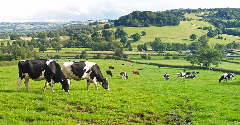News
Green Light for Vegetables
20 Nov 2015
A key trend in healthy eating in recent years has been the move to increase the fruit and vegetable content of our diets, with a particular focus on children’s consumption levels. While increasing fruit consumption has been less of an issue and some initiatives have seen some success, efforts to increase vegetable consumption have not tended to fare so well. In response to this, cookbooks started to focus on ways to increase vegetable consumption in the diet, often by disguising it in some way in recipes for more popular options. This trend is also now being reflected in the packaged food market. Initiatives in recent years have mainly focused on getting more vegetables into our children’s diets, but there are now signs that this may be broadening out to focus on adults and the whole family.
Vegetables are beginning to appear in diverse products, particularly in the beverage aisle, where vegetable smoothies no longer seem to be products for the niche new-age consumer. In fact, the number of smoothies tracked with vegetables is growing significantly, with just 35 global launches recorded in the first half of 2011 and 170 tracked in the first half of 2015, following several years of strong growth. Innova Market Insights reported a +29% increase in vegetables in 2014 from 2013. The leading vegetables for 2014 were: carrot (37%), vegetables not specified (20%), tomato (17%), beetroot (12%), cucumber (7%), celery (6%) and kale (5%). Children can be very resistant to eating their veggies, and there is now a wide range of children’s meals featuring “hidden vegetables,” where they are pureed and blended with other ingredients, such that their use is not immediately obvious. Some of the smaller specialist baby and children’s food brands have been highly active in this area, including Annabel Karmel in a number of countries and Little Dish in the UK, which introduced a “hidden veg” tomato sauce containing vegetables. This has been sold on its own in a pot as well as used in selected recipes, most recently what is claimed to be the UK’s first “healthy” chilled pizza range aimed at toddlers.

But moving away from the children’s market, Orkla of Denmark launched its Pastella Vegetable Pasta range of fresh pasta with a 40% vegetable content in the first half of 2015, featuring Carrot, Broccoli & Peas and Cauliflower options. Claimed as a category innovation, the three styles of pasta feature the taste and texture of standard fresh pasta, but with the high vegetable content. Pastella already claims market leadership in fresh pasta overall in Denmark, Sweden, Finland and the Netherlands and is clearly hoping to further develop its position with this concept.

To accompany pasta, there has also been ongoing activity in hidden vegetables in pasta sauces, particularly using a tomato base with additional vegetables mixed in. In the UK, Mars’ Dolmio and Mizkan’s Ragu (formerly owned by Unilever) both have Smooth Hidden Vegetable options in their glass jars ranges, featuring at least one portion of the recommended 5-a-day in a smooth tomato-based sauce with added vegetables.

Lu Ann Williams, Innova Market Insights

Related news

Has ‘clean’ had its day?
22 Dec 2025
Wielding clean-label positioning and fortification as marketing levers is a dangerous strategy, and brands would be better off explaining the hows and whys of the ingredients in their products, say experts.
Read more
Celebrating the winners of the Fi Europe Innovation Awards 2025
3 Dec 2025
Food industry stakeholders celebrated as the winners of the Fi Europe Innovation Awards were announced at a ceremony in Paris.
Read more
Alternative protein startups pivot to B2B ingredients amid funding shift
27 Nov 2025
Alt protein startups are pivoting from consumer meat analogues to high-value B2B ingredients, driven by stronger investor interest, better margins, and clearer commercial pathways.
Read more
Walmart Marketplace’s record growth prompts search for UK sellers
26 Sep 2025
Walmart’s third-party e-commerce platform, Marketplace, has witnessed extraordinary growth – but a need for more product diversity has prompted the retailer to recruit UK sellers.
Read more
The winners of Vitafoods Europe Startup Challenge 2025 revealed
29 May 2025
Four startups – Yomio Drops, PFx Biotech, Revobiom, and Favamole – took top prizes at this year’s Vitafoods Europe Startup Challenge awards.
Read more
East takes on West in the fight for future food flavours
30 Apr 2025
Asian and South American flavours are now key components on global menus, driven by a growing global appetite for culinary mashups.
Read more
Food companies urged to bring ‘joy’ and urgency to healthy food mission
14 Mar 2025
For too long, businesses have treated health and sustainability as separate agendas – but there is growing evidence to show diets that benefit human health can also enhance that of the planet, say experts.
Read more
Entries open for inaugural Vitafoods Europe Innovation Awards
29 Jan 2025
Entries are open for the inaugural Vitafoods Europe Innovation Awards, celebrating the ingredients, finished products, partnerships, and initiatives redefining the nutraceutical landscape.
Read more
Paris Olympics: Food and beverage brands champion health, fun, and sustainability
5 Aug 2024
Food and beverage brands are aligning with the Paris Olympics 2024 Food Vision, which emphasises sustainability, local sourcing, and plant-based diets.
Read more
Natural Remedies: Bringing health and happiness via validated branded ingredients
18 Apr 2024
Natural Remedies is an internationally renowned botanical healthcare company committed to advancing the field through rigorous research and the development of clinically validated Branded Ingredients. Guided by our foundational principle of ‘BEING USEF...
Read more